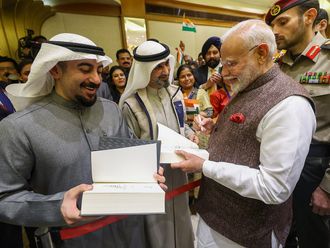Islamabad: Pakistan has allowed a US diplomat involved in a fatal traffic accident to leave the country, an official said Tuesday, following a weeks-long standoff and street protests over the incident.
The diplomat — described as the defence attaché in an earlier report — departed Islamabad late on Monday, a senior Pakistani government official told journalists on condition of anonymity.
“We can confirm that the American diplomat, who was involved in a tragic car accident on April 7 in Islamabad, has departed Pakistan,” Nolen Johnson, a State Department spokesman, said in an email.
Pakistani authorities made no comment about the sudden departure of the diplomat, who found himself at the centre of the latest diplomatic dispute between the two countries. Local news media outlets reported the departure of the diplomat, citing anonymous official sources.
The diplomat, Col. Joseph Emanuel Hall, a military attaché at the US Embassy in Islamabad, is accused of having run a red light and fatally hitting a 22-year-old man on April 7. Another passenger on the bike was injured.
Authorities did not arrest Hall because he had diplomatic immunity. But as a furore here grew over the accident, he was barred from leaving the country, and Pakistani officials said he faced criminal charges.
A C-130 cargo plane that was sent to fly Hall out of Pakistan had to return last week after Pakistani authorities refused to let him board.
Pakistani officials had been demanding that the United States waive Hall’s diplomatic immunity, but US officials refused.
Alice G. Wells, a senior State Department official, visited Islamabad last month to discuss the case.
Last week, the Islamabad High Court ruled that the colonel did not enjoy full diplomatic immunity and gave the government two weeks to decide whether he should be placed on the Exit Control List, an official roster of names that bars people from leaving the country.
The United States and Pakistan imposed travel restrictions on each other’s diplomats last week as the dispute continued to simmer. Ties between the countries have frayed since January when the Trump administration announced that it had suspended nearly all of the $1.3 billion in annual security aid given to Pakistan.
Before the announcement, President Donald Trump had complained on Twitter that Pakistan had “given us nothing but lies & deceit” and accused it of providing “safe haven to the terrorists we hunt in Afghanistan.”
The Trump administration has also sought to strengthen ties with India, Pakistan’s bitter rival. A sports utility vehicle in which the diplomat was travelling hit a motorcyclist and his passenger at an intersection in Islamabad last month.
Atiq Baig, 22, died of head injuries while his cousin, who was the passenger, was injured.
Weeks later, a second accident involving a US diplomat colliding with a motorcyclist also made headlines in the country but only resulted in minor injuries.
Tensions are simmering between Islamabad and Washington as the US pushes Pakistan to crack down on safe havens it allegedly provides for militants.
In January the White House suspended nearly two billion dollars in funding in an attempt to force Pakistan to halt its alleged support for the Afghan Taliban and other Islamist groups.
Pakistan has long denied the accusation.
In the wake of the fatal collision, the Pakistani media drew repeated comparisons with the fatal shooting of two men by CIA contractor Raymond Davis in the eastern city of Lahore in January 2011.
After months of negotiations, a Pakistani court eventually freed Davis following the payment of $2 million to the families of the dead men.












